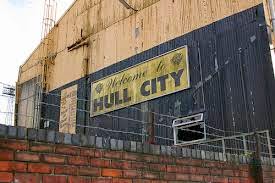 While our return to Central Midlands League action last Saturday was as welcome as it was overdue, the chances of either of our County League squads getting to kick a ball remain some way off, especially given the dismal weather that has been with us again this week.
While our return to Central Midlands League action last Saturday was as welcome as it was overdue, the chances of either of our County League squads getting to kick a ball remain some way off, especially given the dismal weather that has been with us again this week.Neither the Reserves nor the Casuals have played since 12 December. Given that both are scheduled to be at home this Saturday, it would appear likely that they will soon have gone exactly two months without a game.
 When Vice-chairman Mike Wilson conducted an impromptu inspection early this week, the main pitch had seventeen areas of standing water on it. The “pitch across the ditch” had only one – but it stretched from the goalmouth to the halfway line!
When Vice-chairman Mike Wilson conducted an impromptu inspection early this week, the main pitch had seventeen areas of standing water on it. The “pitch across the ditch” had only one – but it stretched from the goalmouth to the halfway line!I’ve been a member of Easington United for over twenty years now and I have not known a season like this for disruption, despite being able to recall some fairly wet winters.
Even Harry Jackson’s fiercely protective nature towards his sacred turf at Humbleton during our residence there in the early years of the HPL never witnessed a run of postponements as that currently being experienced…although he did manage seven call-offs for wet or frozen pitches in 2000/01!
The worst barren run I had experienced prior to the current season came during 1997/98 when, as player-manager of the Second XI, I saw five successive matches postponed between 20 December and 24 January (albeit the first of these, at Barkers, was due not to the weather but to the Beverley side’s inability to raise a team).
The following season saw ten Reserve team postponements in a sixteen-week period between 14 November 1998 and 6 March 1999. Again, however, four of these were due to reasons other than the weather.
 At first team level I had always thought of 1994/95, our first season in ER County League Division 1, as being a particularly bad one but on checking the records I would appear mistaken; just the first three games of the New Year fell victim to waterlogged pitches back then.
At first team level I had always thought of 1994/95, our first season in ER County League Division 1, as being a particularly bad one but on checking the records I would appear mistaken; just the first three games of the New Year fell victim to waterlogged pitches back then.Prior to my joining the club, the winter of 1981 (often referred to during the recent cold snap) was bad with only one fixture played between 4 December and 30 January. The following year was similarly disrupted, with just two games played in the same spell.
Going further back into the club’s history, the North Sea flood of January 1953, in which the pitch was submerged and the changing rooms were washed away, only prompted a request to postpone fixtures “for four weeks” while the players were involved in “coastal defence work”.
In fact you have to go back to 1950/51 to find similar disruption to that being currently experienced. That season the Eastenders were inactive from 9 December to 10 February.
And when the rain finally abated, the snow came as reported by the Hull & East Yorkshire Times of 24 February: “Reaching about blizzard force, the blinding snowstorm which swept across most South Holderness League grounds caused the abandonment of all but two games”. One of those to survive was Easington’s league cup tie against near neighbours Holmpton – only their second fixture to be played in thirteen weeks.
I’ve spoken to several players of that period as part of my ongoing research into the history of the club. Most can barely recall their undulating home grounds at South End Farm and Low Farm being anything other than wet on match days. Some of these players are now regular spectators and often comment on seeing games called off: “We played on a lot waarse pitches than this!” I’m sure they did.
Playing conditions during those formative years are the source of many an anecdote for the aforementioned book, as the following extract shows:
“Frank Douglas recounts an amusing episode when playing at the original South End ground for visitors Holmpton. Having been upended in one of the “land bottoms” (troughs) which was submerged in water, he found himself held down by Easington skipper Rex Newsam who had his knee on his back. “I came up near drooned (drowned), spluttering an’ coughing. He was laughing like hell was Rex!”Arthur Piggott, who began his playing days with The Eastenders in 1948 and went on to become Club Chairman in 1961, also recalled what he termed “rum conditions”; not only at home but right across the East Riding. He described it as “like playing in the River Humber at times” and can recount a game played in Hull at which the pitch was flooded at both ends: “The ref said, ‘You’ve come a long way lads, I don’t want to send you back home so we’ll play’. However, he introduced a proviso that each time the ball landed in standing water it immediately became the goalkeeper’s!”Frank Douglas also remembers this incident: “Aye, we played the whole game under those rules – I thought it was ice though, not wather” “Well it was mucky whatever it was!” replied Piggott.One player who reportedly lapped up the wet conditions was Gordon Lount. According to team-mate Tom Robinson (who joined the Eastenders in 1952 and went on to complete 23 years service with the Club before returning as volunteer groundsman in the late Eighties) Lount’s love of wet pitches gained him “the reddest thighs that would clap together when he ran!” Apparently his favourite trick was to take the ball into the flooded areas and beckon the opposition to come and get it. Gordon Clubley recalled a match against Paull when, similar to Frank Douglas’s earlier tale, Lount “knocked a bloke over in the water then sat on him”!”
The bad weather of 1950/51 prompted Frank Robinson, long-time stalwart of local football, to write in the Holderness Gazette: “Cancellation of matches through bad weather, muddy and waterlogged grounds, and other causes are becoming a serious factor if one hopes to see the completion of the league fixtures this season, especially with Division 2. Whilst it has been one of the wettest seasons on record, cancellations have become too frequent and in some cases minor excuses have been the cause. I have seen most of the grounds in South Holderness but none compare with Withernsea A.F.C. who have revelled in the clay and mud and completed nearly all their fixtures.”
He continued: “Twenty years or so ago cancellations were almost unknown and one can recall games played in snow and rain and hail with the grounds almost submerged in water. Whether we were a hardier race in those days or whether the game came first, win or lose, I cannot say, but it’s worth a moment’s thought – isn’t it?”
It is.
It is.
An edited version of this will appear in the match programme for the Church Warsop game on 13 February...weather permitting of course!























No comments:
Post a Comment